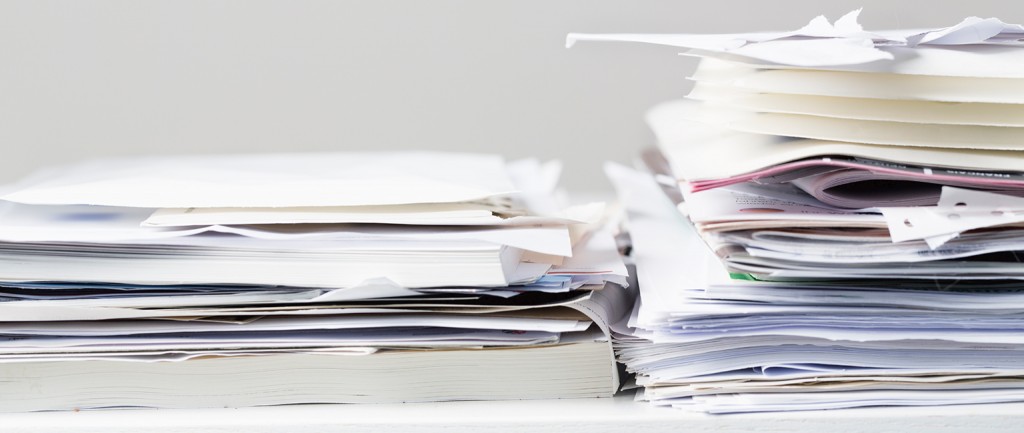9 types of paperwork you need to throw away

Being a functioning adult comes with a lot of paperwork. There are receipts and confirmations given to you for almost everything and most people have a deep-seated fear of accidentally throwing away something important.
Which is a logical fear because trying to acquire official replacement of lost important documents is time consuming and expensive.

We’ve put together a list of the nine types of paperwork you can actually throw away.
1. Bank statements
Firstly, you should contact your bank and tell them to stop sending you hard copies of your monthly statements. What your bank sends you is a print out of what’s available to you with online banking so there’s no benefit in keeping piles of old bank statements cluttering up your office space.
Ask your bank to stop sending you hard copies of your statements.
2. Pay slips
Your employer or workplace should provide you with electronic access of your payslips. You only need to keep payslips from the last seven years of employment so anything that precedes this date can be shredded and disposed off.
3. Tax documents
You only need to keep the last seven years worth of tax information and documents. If you’re 30 and you still have a copy of your tax return receipt from your summer job you had when you were 16 and you lodged a tax return that year, you can definitely throw those away.
Financially fit: Easy steps to check your financial health
4. Out of date medical records
It feels strange to throw away medical documents but most medical information is stored electronically so you’re only doubling up if you keep a physical copy of it. If you had a script filled for a flu you had in 2012, you can definitely throw the receipt away. You can take photos of anything you’re not sure about and store them digitally. Tip: If you have serious and ongoing health problems you should keep all documentation associated with that illness any documents with signatures should also be kept.
5. University textbooks & assignments
University textbooks are expensive but keeping them long after you’ve graduated isn’t going to make them more valuable. It’s totally fine to keep a few assignments or projects from your university days but if you’ve got files full of sub-par essays that you barely remember writing, ditch them.
Time to ditch the files full of sub-par essays from university days.
6. Paid bills

Once you pay an online bill and you have the receipt number, you don’t need to keep the paper copy. If you pay bills in person at the post office, you can take a photo on your smartphone of the receipt. Tip: The word ‘paid’ written by hand on a piece of paper isn’t proof of anything so throw away hard copies of bills once you have a proof of payment receipt number.
7. Instruction booklets
This is a little known fact but most appliances have instruction booklets online. If you buy a new appliance, do a quick Google search for a PDF of the instruction booklet. If it’s available online, throw away the hard copy. It feels very counterintuitive but think about it this way – you rarely use the instruction booklet for an item after you’ve bought and if you do need the instruction booklet you can usually never find it anyway. Let Google do what it’s best at.
8. Out of date warranties
Of all the things you should hold on to warranties is one of them because most companies won’t accept anything but the piece of paper the warranty is written on, but if it’s out of date, it has to go. Even if you’re still using the appliance – ditch it. It’s worthless.
If it’s out of date, it has to go.
9. Superannuation statements
These are similar to bank statements. You need to contact your superannuation fund and ask them to stop sending paper copies of your statements. They’re just unnecessary print outs of information that’s available online.
Stay sane: 6 tips for keeping your paperwork organised
Tip: Never throw away birth certificates, marriage certifications, university qualifications, police check statements needed for employment or any documents you may need for current or pending court appearances. Official statements of accrued hours for personal development and other important employment documents should also be kept.







